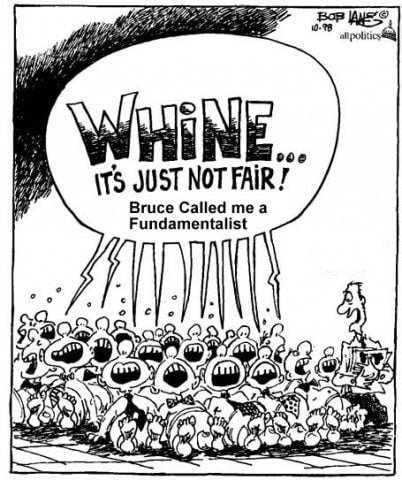
I have been writing about Evangelical Christianity for thirteen years. The most common criticism I receive from God’s chosen ones is that I paint with too broad a brush, that Evangelicalism is not a monolithic group, that there are all sorts of beliefs and practices within the Evangelical tent. When I am critical of Evangelicalism, some Evangelicals self-righteously tell me that what I wrote doesn’t comport with their flavor of Evangelical Christianity. My beliefs are different! My church is different! My pastor is different! And on and on it goes.
Mention that all Evangelicals are inherently Fundamentalists, why, the defenders of the one-truth-faith will scream in outrage, saying that they are NOT Fundamentalists. However, a careful examination of their beliefs and practices shows that they are indeed Fundamentalists. In 2020, I wrote a post titled, Are Evangelicals Fundamentalists? In this post, I conclusively showed that all Evangelicals are theological Fundamentalists, and most of them are also social Fundamentalists. If a person/church/pastor/sect walks and talks like a Fundamentalist, it is one. If Evangelicals don’t like the Fundamentalist label, I suggest they either leave Evangelicalism or change their beliefs and practices.
Yes, Evangelicalism is a broad tent, and anyone can claim the Evangelical moniker regardless of beliefs. However, central to Evangelicalism are certain fundamental/cardinal beliefs. To be an Evangelical, you must believe these things. That some people don’t believe these things shows that Evangelicalism has no vehicle to police its ranks. The same can be said for social practices. It was not that long ago that all Evangelicals believed homosexuality was a sin. Today, LGBTQ people are welcome in some Evangelical churches — a good thing, by the way. However, at what point does a person/church/pastor/sect stop being Evangelical?
One of the problems is that many people claiming the Evangelical label are Evangelical in name only. Their reasons for wearing the label are many: lifelong identity, family, an affinity for Evangelical worship practices, comfortableness, to name a few. Further, Evangelicals look outside of their tent and see nothing in mainline/progressive Christianity that appeals to them. I still “fondly” remember attending the local Episcopal church and enduring unsingable music and incoherent sermons. Give me Victory in Jesus and three points and poem every time.
Since Evangelicalism is the subject of virtually every post on this site (almost 4,000), I don’t have the time to modify the word “Evangelical” every time I use it. To those who whine and complain about my broad-brush painting, if the shoe fits, wear it. You may think your designer label brand of Evangelicalism is different, but I suspect when the fancy label is removed, we will learn that your brand was made in China, just like Walmart’s brand. You just aren’t that special. I know that hurts, but after analyzing the beliefs and practices of hundreds of “special” Evangelicals, I have concluded, if you’ve seen one Evangelical, you have seen them all (almost).
If what I write about Evangelicalism really doesn’t accurately describe you, fine. Move on and nurse your hurt feelings somewhere else. However, I suspect that what is really going on here is that I am getting too close to nailing who and what you really are. The Fundamentalist label may hurt your feelings, but maybe you should take a hard look at your beliefs and practices. Maybe, it is time for you to swear off Evangelicalism. Surely the January 6, 2021 insurrection was enough to tell you that Evangelicalism is terminally diseased. You didn’t vote for Donald Trump, did you? Really? I mean, really?
Bruce Gerencser, 68, lives in rural Northwest Ohio with his wife of 47 years. He and his wife have six grown children and sixteen grandchildren. Bruce pastored Evangelical churches for twenty-five years in Ohio, Texas, and Michigan. Bruce left the ministry in 2005, and in 2008 he left Christianity. Bruce is now a humanist and an atheist.
Your comments are welcome and appreciated. All first-time comments are moderated. Please read the commenting rules before commenting.
You can email Bruce via the Contact Form.
